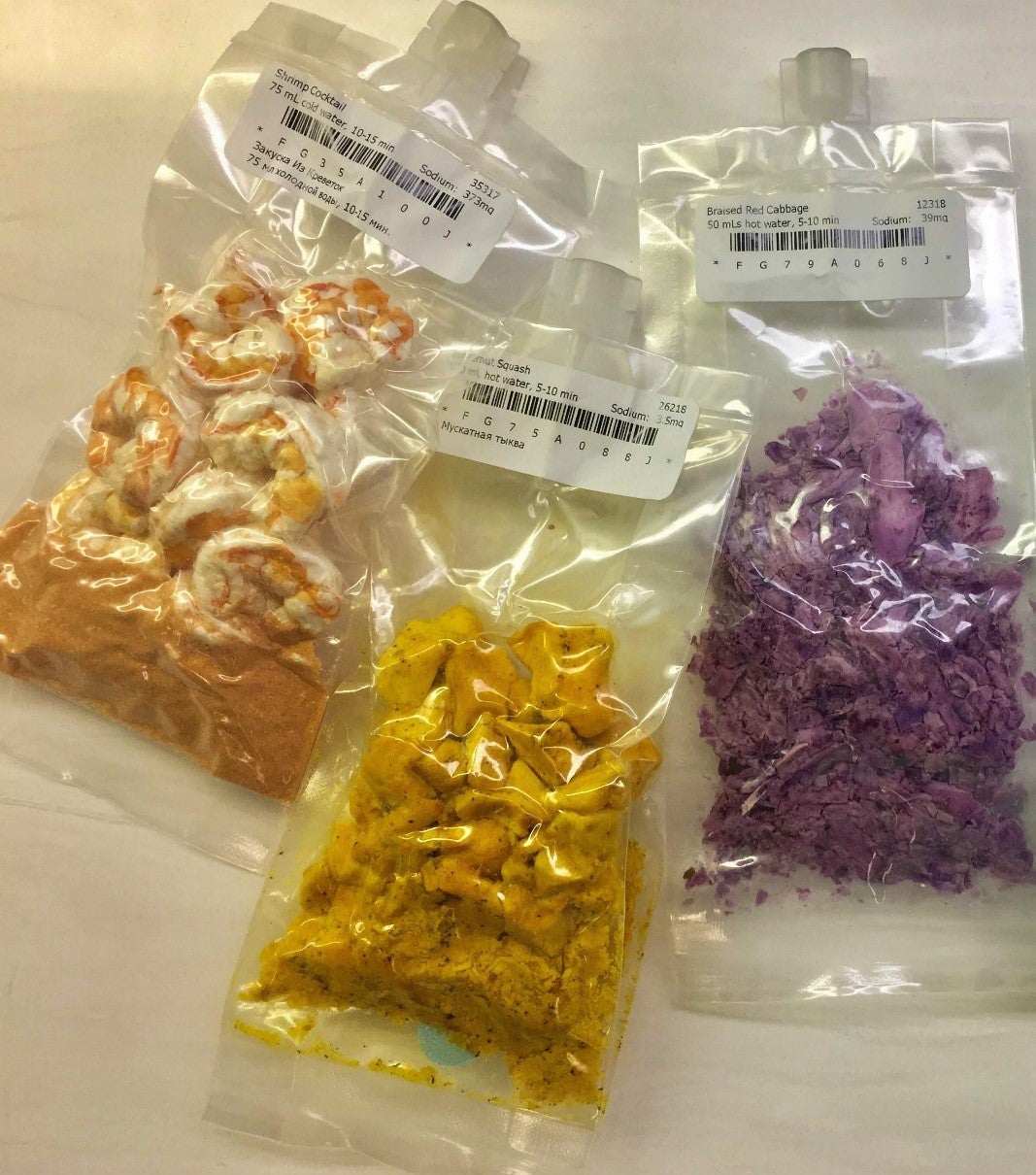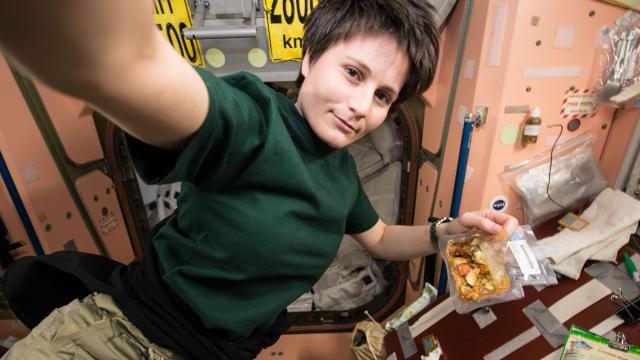Long stints on the International Space Station take a toll on the human body, and it doesn’t help that the food up there is limited by what can be reasonably sent and stored in space. To improve conditions for astronauts, a team of scientists devised and tested a food plan specific to the space environment, resulting in noticeable health and performance benefits.
The ISS, orbiting hundreds of miles above Earth, isn’t the place for sophisticated kitchens and elaborate meals. It costs a lot to transport foodstuffs to space, and once there, it all must be stored as compactly as possible.
A standard spaceflight diet on the ISS aims to replicate healthy diets back home, but research published today in Scientific Reports suggests astronauts could benefit from an “enhanced” diet specific to the space environment. Beyond general health and performance benefits, an upgraded, fruit- and veggie-packed diet could potentially mitigate the deleterious effects unique to working in space, according to the researchers. Grace Douglas from the Human Health and Performance Directorate at NASA Johnson Space Centre led the team.
The study aimed to evaluate the impact of the enhanced diet prior to actually testing it out in space. To simulate the space environment, Douglas and her colleagues ran their experiment in NASA’s Human Exploration Research Analogue (HERA) habitat. Sixteen participants, working in sets of four, were confined to the spaceflight simulation chamber for 45-day stints. The 10 men and six women between the ages of 30 and 50 received prior training on how to record their daily dietary intakes, collect biological samples, and run cognitive tests.
In addition to the confined space-like conditions, the foods were pre-packaged and made to be shelf-stable, just like they would be on the ISS. Individuals either ate the enhanced diet or the standard diet, the latter serving as the control group.

The enhanced diet featured an increased number of servings as well as a greater variety of fruits and vegetables, more fish, and added sources of flavonoids and omega-3 fatty acids, compared to the standard menu. The participants consumed more than six daily servings of fruits and vegetables and ate roughly two to three servings of fish each week, in addition to other healthy foods. Over the course of the simulated 45-day mission, each participant provided samples of urine, saliva, blood, and stool, while also completing cognitive tests.
Interestingly, participants in both groups lost a little bit of weight. But for those on the enhanced diet, they experienced some discernible benefits. “Overall, subjects consuming the enhanced diet had improved nutritional intake that associated with several improvements in markers of health, stress, and cognitive performance, as well as greater stability in the microbiome [i.e. microbial gut health]…compared to subjects consuming the standard diet,” the scientists wrote in their study. More specifically, this included lower cholesterol and cortisol levels (the latter suggesting reduced stress) and boosts to cognitive speed, accuracy, and attention.
“This study provides evidence of health and cognitive performance benefits from an enhanced spaceflight diet starting early in a mission,” the researchers claim. They added that the study “provides important ground-based baseline data” to compare with spaceflight data pertaining to “added stressors” like microgravity and increased exposure to radiation. That said, future research is needed to better evaluate the enhanced diet as a potential countermeasure to these harmful effects, the scientists said.
I like this study, but it feels incomplete. The obvious limitation is that the participants consumed these foods on Earth and not the intended environment of space. A smart next step would be to replicate this 45-day study in space and note potential differences, such as the cortisol levels, as working in space is likely far more stressful than just biding time inside of HERA. Also, 45 days is a drop in the bucket compared to actual long-duration missions, which typically last for six months. I’d like to know how the enhanced diet works across that much longer, more relevant, timeframe.
A larger sample size would also be nice, and include more women, individuals with varied dietary needs and restrictions, medical conditions (such as diabetes), different kinds of body masses, and people on certain medications. The researchers, aware of the low sample size, said their approach still “provided important insights into impacts from the complete spaceflight diet.”
Related: Life in Space Affects Men’s And Women’s Health Very Differently
These concerns aside, the paper does enhance our understanding of the foods needed to keep astronauts healthy, vibrant, and productive. And as the researchers point out, foods might even protect crews from the ravages of space.
“Food is the one potential countermeasure that will absolutely be included on future exploration-class space missions,” to “enable safe exploration far beyond low-Earth orbit,” the researchers wrote. Indeed, it’s important that we think about this now, as space becomes increasingly accessible, be it through trips around the Moon, expeditions to Mars, or stays aboard private space stations.
More: Astronauts Can Suffer a Decade of Bone Loss During Months in Space, New Research Suggests
